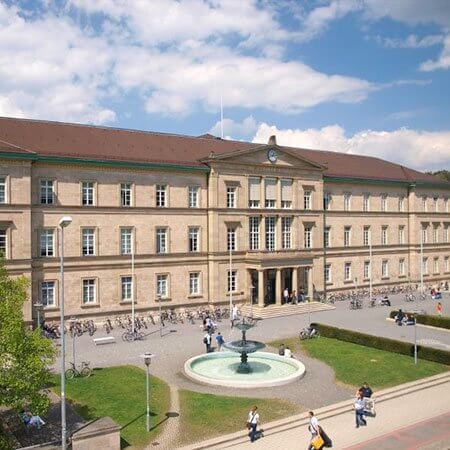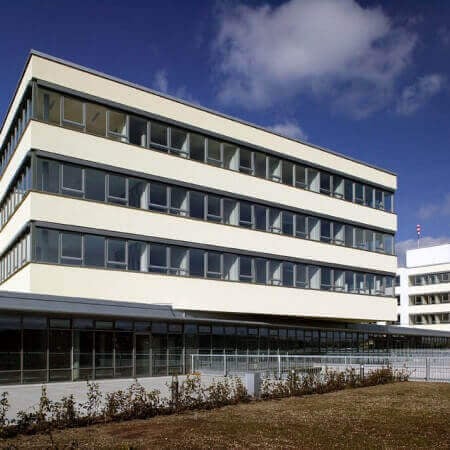An epigastric hernia (a hernia Linea Alba) is one of the most common types of hernias, which, if left untreated, can lead to intestinal incarceration and the partial death of the organ. To avoid any complications, it is better to undergo timely surgical treatment. If your hernia continues to grow or has already reached a size of more than 4 cm, the operation should be performed as soon as possible. You are kindly welcome to use the services of the Booking Health company to make an appointment for your diagnostics and treatment of epigastric hernia in Germany at the best price.
Content
- What is an epigastric hernia?
- Principles of surgical treatment
- Surgical approaches
- Why is it worth undergoing surgery abroad?
An epigastric hernia is treated with surgical techniques. Doctors perform laparoscopic or open surgery. Small hernias (up to 1 cm) are sutured, and in other cases, the defect is closed with a mesh.
You can undergo your treatment in one of the following hospitals: University Hospital of Ludwig Maximilian University of Munich, University Hospital Marburg, or University Hospital Carl Gustav Carus Dresden.
You don't need to take care of the organization of your treatment trip yourself. The Booking Health company will select a clinic and a doctor for you, make an appointment, help you apply for a visa and get to the clinic, and take care of your transfers and apartment. In the clinic, you will be accompanied by a medical interpreter, and you can always contact your personal medical coordinator for any organizational issues.
What is an epigastric hernia?
An epigastric hernia is a protrusion of the internal organs through a defect in the white line of the abdomen, with the center of the defect in the midline above the navel to the xiphoid process. Hernias can be small (up to 1 cm), medium (up to 4 cm) and large (more than 4 cm). The disease has two age peaks. The first one is for children under the age of 5. The second one differs depending on gender: most hernias in men develop at the age of 60-70, and women are affected by the pathology between the ages of 30-40 years.
The causes of the disease are as follows:
- diverticular disease;
- obesity;
- ascites;
- pregnancy;
- rectus abdominis diastasis;
- congenital connective tissue dysplasia.
In most patients, an epigastric hernia is diagnosed during a clinical examination, without the use of any additional imaging methods. Preoperative imaging (an ultrasound, CT, X-ray, or MRI scan) is only required in patients with abdominal pain without a palpable hernia and in obese patients. Diagnostic tests are usually carried out to measure the size of the defect when planning a surgical approach.
Principles of surgical treatment
A repair surgery for a hernia Linea Alba is a simple operation, which is well tolerated by patients. The frequency of complications in this type of surgical intervention does not exceed 3.5%.
Surgical treatment can be as follows:
- elective surgery;
- emergency surgery – this type of surgery may be required for incarcerated hernias.
Elective epigastric hernia repair surgery can be performed both with sutures or with a mesh. The easiest method of treatment is to suture the defect. However, studies show that suturing is not very effective, since the recurrence rate during long-term follow-up reaches 50%. Therefore, the suturing technique is rarely used in developed countries, mainly just for small hernias.
The use of a mesh for epigastric hernia repair provides a lower recurrence rate. The mesh also does not increase the risk of surgical site infections, seroma, hematoma, or chronic pain. It is this method that foreign doctors prefer to use in most cases.
Emergency hernia repair surgery is often supplemented by the removal of part of the non-viable intestine. The defect will then be eliminated by placing the mesh. Such surgical procedures are more complicated, more often cause complications, and have a 15 times higher mortality rate compared to elective hernia repair surgery. Therefore, it is better for patients to have timely treatment of their hernia, and not to wait for their hernia to be incarcerated.
Sometimes an operation is performed against the background of infectious complications. Then, a synthetic mesh will only be placed if the defect is larger than 3 cm, while smaller defects will be sutured. In addition, some hospitals use biological meshes that dissolve over time. Another option to make the operation safer for a patient is to place the mesh outside the abdominal cavity.
Surgical approaches
The operation can be performed using the classical method, through a long abdominal incision or laparoscopy.
Doctors abroad prefer performing a laparoscopy. This surgical technique not only makes the operation less traumatic and shortens the rehabilitation period, but it also improves the aesthetic outcomes of the operation and reduces the risk of wound complications. A laparoscopy is considered the first choice for hernias larger than 4 cm. In addition, laparoscopic interventions can even be resorted to for hernias of 1-4 cm in size, if the patient has a risk of developing a wound infection.
The most commonly used operation is IPOM, which involves the placement of the mesh in the abdominal cavity. Modern hospitals also use the latest techniques, such as eMILOS, eTEP, and robot-assisted operations with extraperitoneal mesh placement. These are even safer and reduce the risk of mesh displacement, adhesion formation, seroma, and hernia recurrence.
Why is it worth undergoing surgery abroad?
Hospitals in any country of the world perform operations for epigastric hernias. But still, many patients go to Germany for their treatment, as here, they can count on having a lower risk of hernia recurrence and a quick recovery. There are a few reasons for you to undergo your hernia treatment in one of the German hospitals:
- minimally invasive laparoscopic surgery;
- latest techniques for minimally invasive interventions, providing a low risk of recurrence and complications;
- specialized centers perform robot-assisted operations;
- doctors use anti-adhesion barrier prostheses instead of conventional synthetic meshes;
- doctors can implant a mesh outside the abdominal cavity to reduce the risk of infections and hernia recurrences;
- use of absorbable meshes, which dissolve after hernia repair and surgical wound healing;
- meshes are fixed with non-absorbable or slowly absorbable sutures to reduce the risk of recurrence;
- operation can be performed under local anesthesia, which shortens the hospital stay.
Please leave your request on the Booking Health website to undergo your treatment abroad. We will select the most suitable clinics in Germany for you and arrange your trip. The cost of your treatment will be reduced due to the lack of additional coefficients for foreign patients.
Authors:
The article was edited by medical experts, board-certified doctors Dr. Vadim Zhiliuk and Dr. Sergey Pashchenko. For the treatment of the conditions referred to in the article, you must consult a doctor; the information in the article is not intended for self-medication!
Sources:
National Library of Medicine
Healthline
Medscape




















